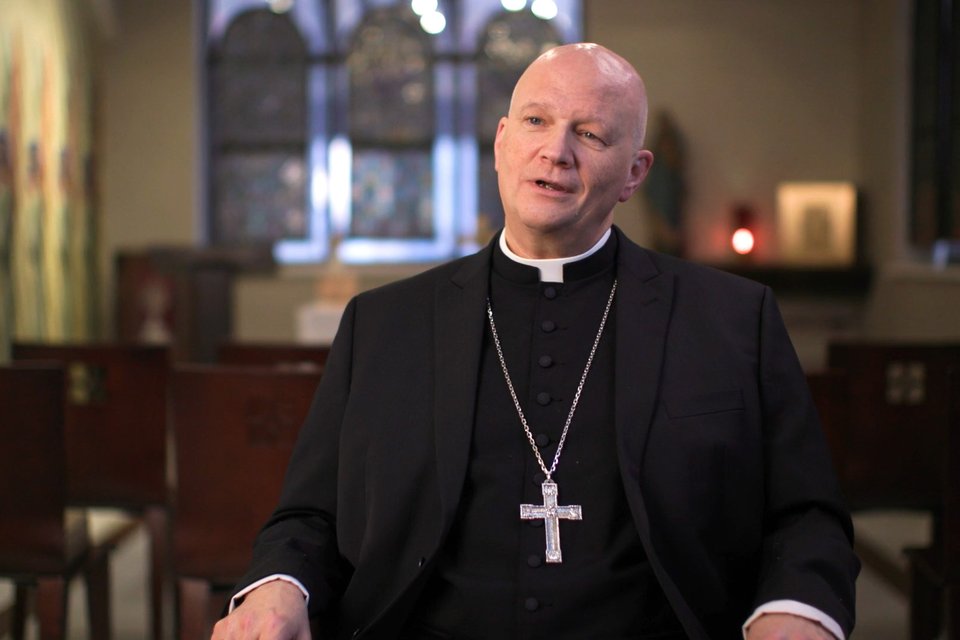On Divine Mercy Sunday, chief shepherd reflects on Jesus’ gift of mercy through the sacrament of reconciliation
DETROIT — Jesus’ Divine Mercy means that not only are mankind’s sins forgiven, but they have been adopted as sons or daughters of God, Detroit Archbishop Allen H. Vigneron said.
For the seventh consecutive week, Archbishop Vigneron celebrated Mass on April 19, Divine Mercy Sunday, in a near-empty Cathedral of the Most Blessed Sacrament as the state continues to grapple with the COVID-19 pandemic.
Despite physical distance, the faithful are spiritually united through the same Holy Spirit Christ breathed on the apostles in the upper room, Archbishop Vigneron said.
On the Cross on Good Friday, Jesus gave up his Spirit, but at “an hour unknown to all but God and the angels,” the Holy Spirit came back into the body of Jesus Christ, where he was “saturated in the full glory of the Son of God,” Archbishop Vigneron said.
In a likewise matter, Jesus bestowed the same Holy Spirit on his apostles, the Church’s first bishops, who received the power to forgive sins and bestow on others the mercy of God — establishing the sacrament of penance.
“In breathing the Holy Spirit on the apostles, Jesus begins the mission of his disciples, the Holy Spirit with his mystical body, alive with the body arisen from the tomb,” Archbishop Vigneron said.
The Holy Spirit is more than a spirit of mercy and forgiveness, Archbishop Vigneron added, but a spirit of adoption, wherein Christ’s followers become co-heirs to the kingdom of God, a kingdom that overcomes death and sickness.
“Rightfully, as we celebrate this day of the Sunday of Divine Mercy, we come to appreciate more the sacrament of penance and reconciliation,” Archbishop Vigneron said. “We understand this gift of forgiveness of sins is not a mere penal forgetting of debt, but the debt has been wiped out and we have been transformed when we enter into the Holy Spirit.”
This renewal is strengthened every time the faithful take advantage of God’s Divine Mercy in the confessional, Archbishop Vigneron added.
“How could we not appreciate this life-giving grace of penance, the grace to go to confession?” Archbishop Vigneron said. “This grace cost Jesus his life. He paid with his life so we can have it. This is a great Sunday for us to renew our resolve to receive this grace frequently with great gratitude.”
As the number of COVID-19 cases in Michigan are beginning to plateau — with 30,791 cases as of April 18 and 23,743 of them in Wayne, Oakland and Macomb counties, the heart of the Archdiocese of Detroit — Archbishop Vigneron thanked the front-line workers and first responders who have shown great acts of charity and mercy.
“As I read the newspaper and watch the stories online, I’m impressed by how many of you are agents of mercy in this difficult time, especially those who are doctors, nurses, health care professionals and first responders,” Archbishop Vigneron said. “We appreciate each of you on a deeper level for what you do, acting as God’s adopted sons and daughters, imitating the courage of Jesus and the mercy he made available.”
“As I read the newspaper and watch the stories online, I’m impressed by how many of you are agents of mercy in this difficult time, especially those who are doctors, nurses, health care professionals and first responders,” Archbishop Vigneron said. “We appreciate each of you on a deeper level for what you do, acting as God’s adopted sons and daughters, imitating the courage of Jesus and the mercy he made available.”
Archbishop Vigneron finished his homily with the a letter he received from a fifth-grader at an archdiocesan school, who wrote to the archbishop about a conversation the student and his father had about Jesus’ fear in the Garden of Gethsemane and how He overcame that fear to redeem the world.
“My dad and I were talking about the Lenten season and especially Jesus and his sacrifice,” the fifth-grader wrote. “He told me about Jesus in the garden, Jesus being afraid of his own death. He must have felt very alone. Jesus faced his fears, however, because he was willing to sacrifice his life for all of us. He put his fear and loneliness aside to save us all. To me, this is the meaning of Lent, having the courage to live the sacrifice of Jesus, and love people enough to let go of being afraid in order to live for them. My dad and I talked about the sacrifice of Jesus’ life. I know we sacrifice things, too, for Lent, but after talking about this, I thought my sacrifice was too small. I want to have more courage, like Jesus. I want to be a good person so that Jesus knows that I deserve what he did you for me.”
Archbishop Vigneron reflected on the fifth-graders letter, and how it seemed to cut to the very heart of the message of Divine Mercy and forgiveness.
“A fifth-grader, a powerful witness,” Archbishop Vigneron commented.
“What Jesus said to the 11 in the upper room, he says to all of us: ‘As the Father has sent me, so I send you.’ Each of us needs to hear that word — is invited to hear that word — addressed to the deepest center of our heart. Jesus needs you and me to spread His mercy, to be agents of His mercy, to witness to His mercy, to invite others to taste what we have tasted: His mercy, which endures forever.”
Watch Mass Live
To view a schedule of livestream Masses available throughout the Archdiocese of Detroit, visit www.aod.org/livemasses.










